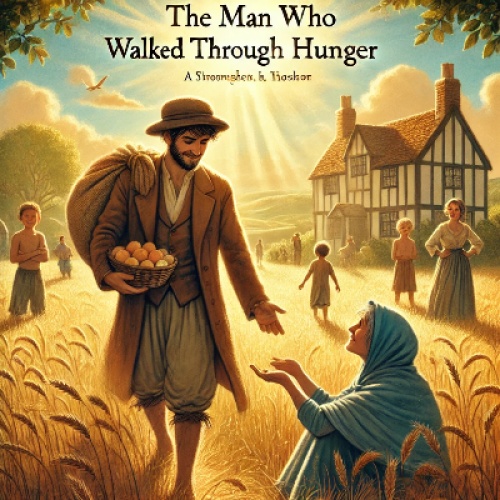In the early mornings, when the world was still wrapped in the cool silence of the night, Harun would make his way to the outskirts of the village, where farmers would begin their day, unloading carts of fresh produce. He didn't ask for handouts - he only hoped that perhaps someone would spare a small portion of food, just enough to quiet the rumblings in his stomach.
But the villagers, busy with their own lives and struggles, didn't notice him. To them, Harun was just another face among many, the silent figure who passed by each morning with a tired smile. He never complained. His hunger had become something he had learned to live with.
One day, as Harun walked through the fields, his stomach groaning louder than usual, he noticed a woman sitting by the side of the road. Her clothes were as ragged as his, and her face was drawn with exhaustion. She looked just as hungry as he felt.
"Are you alright?" Harun asked, his voice gentle.
The woman looked up, startled, and then nodded slowly. "I've lost my way," she said softly. "I don't know where to go, and I have nothing to eat. I'm so tired."
Harun's heart went out to her. He didn't have much to offer, but he knew what it was like to feel lost and hungry.
"I don't have much," he said, "but I can share what little I have."
From his small satchel, Harun took out the half-loaf of bread he had managed to find earlier that morning and broke it into two. The woman's eyes widened with gratitude as she took her share, and they ate together in silence.
When they were done, Harun stood up to leave, but the woman grabbed his arm gently. "Why did you help me?" she asked, her voice trembling. "You have so little. Why share it with someone like me?"
Harun smiled, though it was a sad smile. "Because I know what it feels like to be hungry. And I know that even the smallest kindness can make a difference."
The woman looked at him, her eyes brimming with tears. "But how can you live like this? Every day, walking with nothing. Don't you ever want more?"
Harun sighed. "I used to want more, but over time I realized something. The world is full of people who are hungry, not just for food, but for kindness, for a little bit of hope. I may not have much to offer, but I can give what I have. And that is enough."
The woman was silent for a long time, then finally spoke. "You are right," she said. "I've been so focused on my own hunger, I forgot that kindness is a kind of food too."
Harun nodded. "We all need it. And sometimes, it's the only thing that keeps us going."
As they parted ways, Harun felt a strange sense of peace in his heart. He hadn't found much to eat that day, but he had given something far more valuable - he had shared his humanity. And in doing so, he had found a small piece of something that could fill him up, something that hunger could never take away.
In the days that followed, Harun continued his quiet walks through the village. He never asked for anything, but he often stopped to share a smile or a word with someone who seemed down, someone who needed a little bit of light. And though his stomach was still empty at times, his heart was fuller than it had ever been.
One afternoon, as the sun was setting and the village was bathed in a golden light, Harun was walking past the market when a farmer approached him. He was holding a basket of bread, fresh and warm.
"I've seen you walk through here every day," the farmer said, "and I've heard your story. You've shared more kindness than anyone in this village. So today, I want to share with you."
He handed Harun the basket, and Harun's eyes filled with tears. "Thank you," he whispered. "I don't know what to say."
"You don't need to say anything," the farmer replied with a smile. "You've already given more than you know."
Harun took the bread, and as he made his way back to his humble home, he realized something important. In a world where hunger and hardship often made people turn inward, he had chosen to turn outward. He had chosen kindness over bitterness, compassion over despair. And in the end, that was the greatest gift of all.
And so, Harun's story became one that was told in whispers, not for the bread he had received, but for the kindness he had given, teaching the village that sometimes, the greatest hunger of all is not for food - but for love.





